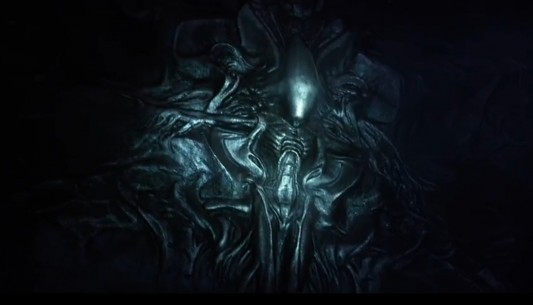The Last Shot, by Daniel Bergamini
WARNING! This article contains massive spoilers for the Ridley Scott film Prometheus! Proceed with caution!
Up until the very last few seconds of Ridley Scott’s Prometheus, I was on board. As anyone who saw the film this weekend knows, it is a frustrating blend of brilliant filmmaking and messy screenwriting. The power of the visuals, acting and atmosphere made me ignore many of the film’s narrative faults, and had me even leaning towards forgiving the messy ending. That is until the film faded back in.
Prometheus is at times a smart film, it is also one with many plot holes. It asks the audience to think, but does not give us all the answers. As many of the unanswered questions are key to understanding the plot, the film suffers for not giving us those answers. And yet, after the film appears to end, it fades back in to answer a question that is irrelevant to the plot.
No matter what you think of the film, it is certainly an ambitious endeavour. Rarely do we see R-rated science-fiction of this scale. In fact, we never do. The film asks big questions, while still delivering action, terror and huge set-pieces. That is a rarity in the studio system these days, and why a studio would finance a 130 million dollar film of this nature is in itself an interesting question. The answer to that question is actually given to us, and it is in the last 30-seconds of the film.
Ridley Scott made some unforgivable mistakes with Prometheus, mistakes that a veteran of cinema should have been able to spot and correct. The last shot, however, is the worst mistake of all. It connects Prometheus to Alien in a way that is so contrived that it almost ruins the entire film.
Scott did something exciting and admirable when he decided to make a big sci-fi film that was based on one element of his classic. He decided to forgo the true connections and make a more distinct, ambitious, and original film.
Unfortunately, all that work is spoiled by that final shot. It connects the two films, but to what end?
The film has a clunky ending, with unnecessary narration that just gets in the way. Given the overall scope of the film, it is surprisingly lazy filmmaking, and yet it would be perfectly easy to forgive it as so much about the film is strong. Unfortunately, the film does not actually end with the initial fade. As we cut back from darkness, we see an Engineer’s stomach burst open and out comes an alien; however this alien is unlike any we have seen earlier in the film. It is THE alien, a xenomorph, the monster that most audience members went to see.
Maybe the scene was designed to superficially satisfy audience members without actually giving them what they wanted in the first place. However, something else seems more likely. The studio needed a tangible connection with the Alien franchise, why else would they finance such a risky film.
The connective tissue between the two films is quite clear, and is actually largely irrelevant to the story being told in this film. The final shot second guesses all that came before it. It lets us know that the filmmakers do not see us as intelligent enough to understand the connected universes of the two films. Instead of making this film about something bigger than Alien, the final shot makes it clear that all that we saw was simply leading to Alien.
The idea for the film may have sprung from the iconic shot of the “Space-Jockey” in Alien, however the film truly lives and dies with that final shot. It seems very likely that the film’s financing hinged on the inclusion of that scene. A Fox studio executive most likely demanded an obvious connection to the Alien franchise beyond the more subtle and interesting elements hinted at throughout the film. The final scene may have helped finance the film, unfortunately, it also made all that came before it irrelevant.































I wouldn’t go as far as saying that the final shot makes the rest of the film irrelevant, but I did almost scream “WHY?” in the theater. That shot is completely useless, and that’s why I simply choose to forget it’s even there.
I thought at first that the final shot was unnecessary. Once I saw the pseudo-face hugger attack the engineer, I knew what the result was going to be and didn’t need to see it actually happen.
That said, I don’t think this is the Xenomorph from “Alien”….not exactly.
The film spends a great deal of time (in my opinion successfully) pondering the nature of religion, evolution, and the meaning of life. A great deal of this time is spent on who has created whom (whether it be engineers creating humans, or humans creating cyborgs), and whether or not the creations live up to the creators’ expectations. The final shot, to me, shows that even though at first it appears the Xenomorph is going to be “the perfect killing machine” because it was designed that way by the engineers, what we actually see is not quite that, but instead we witness nature taking its course. Since the creature is highly adaptive and takes on many of the characteristics of who it was born from, the Xenomorph has a rapid way of evolving. The end, to me, simply adds another layer of subtext to the creationism vs. evolution argument of the film, showing that despite the fact that there was a creator, the way the Alien became the perfect killing machine was through some process of evolution. My guess is that we’re still a few steps away from the Xenomorph from “Alien” (they do take the time to show you that it has some sort of inner mouth, but it’s very different from the Xenomorph’s mouth in Alien), but we’re well on our way.
Let’s not forget the technology gap in the times. I understand the origional Alien had “amazing technologically advanced systems” for the time it was filmed, but something as simple as 3D mapping capabilities make them look obsolete for something thats supposed to come after the prometheus.
There’s also the fact that the engineer was in his chair on the ship, only his chest open when discovered in Alien and not on the floor of an obviously earth based ship torn apart.
And for a movie that’s creation was delayed due to the AVP spin-off, they defeated themselves in their own timelines since the Aliens were supposed to be brought to earth before the Mayan civilization; and were again on earth “present day” in AVPR which is almost 100 years before the evolution of the xenomorph we know as the Alien now according to Prometheus.
And yes, for a movie about future space travel discovering an Alien species that will kill us all; this is where it all falls apart for me. 😉
The technological gap is something I think you just need to ignore, as it is a problem in many films. The Engineer they discover in Alien is not suppose to be the same as the one in Prometheus. In fact, I believe the planet they discover in Alien is not the same planet as the one in Prometheus.
And lastly, AVP is really not canon. It is an awful spin-off that I am sure Scott ignores. Easier to just forget those awful films exist.